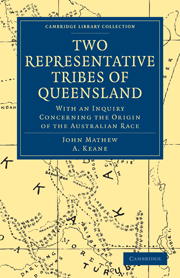 Two Representative Tribes of Queensland
Two Representative Tribes of Queensland Book contents
- Frontmatter
- Contents
- LIST OF ILLUSTRATIONS
- INTRODUCTION
- PREFACE
- CHAP. I INQUIRY CONCERNING THE ORIGIN OF THE AUSTRALIAN RACE
- CHAP. II THE COUNTRY OF THE KABI AND WAKKA TRIBES
- CHAP. III PHYSICAL AND MENTAL CHARACTERS
- CHAP. IV DAILY LIFE—SHELTER—FOOD—CLOTHING
- CHAP. V MAN-MAKING AND OTHER CEREMONIES
- CHAP. VI DISEASE AND TREATMENT—DEATH—BURIAL AND MOURNING
- CHAP. VII ART—IMPLEMENTS—UTENSILS—WEAPONS—CORROBOREES
- CHAP. VIII SOCIAL ORGANISATION
- CHAP. IX THE FAMILY—KINSHIP AND MARRIAGE
- CHAP. X RELIGION AND MAGIC
- CHAP. XI MYTHS AND LEGENDS
- CHAP. XII LANGUAGE
- VOCABULARY
CHAP. XII - LANGUAGE
Published online by Cambridge University Press: 29 August 2010
- Frontmatter
- Contents
- LIST OF ILLUSTRATIONS
- INTRODUCTION
- PREFACE
- CHAP. I INQUIRY CONCERNING THE ORIGIN OF THE AUSTRALIAN RACE
- CHAP. II THE COUNTRY OF THE KABI AND WAKKA TRIBES
- CHAP. III PHYSICAL AND MENTAL CHARACTERS
- CHAP. IV DAILY LIFE—SHELTER—FOOD—CLOTHING
- CHAP. V MAN-MAKING AND OTHER CEREMONIES
- CHAP. VI DISEASE AND TREATMENT—DEATH—BURIAL AND MOURNING
- CHAP. VII ART—IMPLEMENTS—UTENSILS—WEAPONS—CORROBOREES
- CHAP. VIII SOCIAL ORGANISATION
- CHAP. IX THE FAMILY—KINSHIP AND MARRIAGE
- CHAP. X RELIGION AND MAGIC
- CHAP. XI MYTHS AND LEGENDS
- CHAP. XII LANGUAGE
- VOCABULARY
Summary
In the original classification of Australian languages which I give in Eaglehawk and Crow, they are divided into six main classes, designated in accordance with the territory over which they were spoken. The third of these classes includes the dialects of New South Wales and those of the south, the centre, and the east of Queensland. It is to subdivision I of this third class, embracing the coast languages, that Kabi and Wakka belong.
Being the languages of adjoining tribes, they have a number of words in common, but the surprising fact is the dissimilarity between them both in vocabulary and in inflections. The Kabi language is the more musical, and, to my mind, the least corrupt of the two. The Wakka is more consonantal, it has the palatal ch very decided, and its frequent shorter forms, as compared with Kabi, suggest the operation of a wearing-down process, like what in West Australia has in some instances reduced two words, each originally of two syllables, to a monosyllable.
The pronominal and verbal schemes are more perfectly preserved in Kabi than in Wakka. Kabi, also, more closely resembles the Kamilroi to the south-west than Wakka does.
- Type
- Chapter
- Information
- Two Representative Tribes of QueenslandWith an Inquiry Concerning the Origin of the Australian Race, pp. 198 - 224Publisher: Cambridge University PressPrint publication year: 2010First published in: 1910


